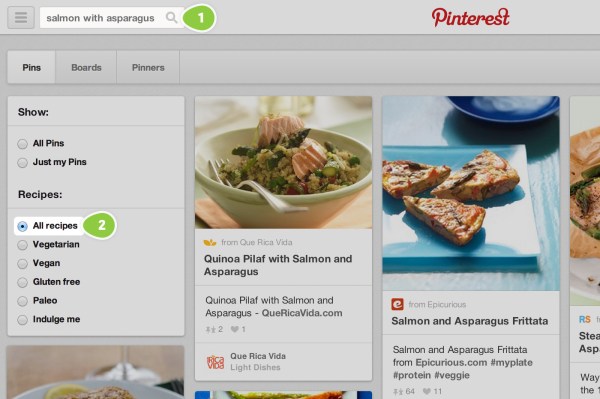Pinterest today is announcing a new feature designed to make it easier for those who use the site to discover, save and share recipes with each other: recipe search. Effectively turning Pinterest into a much smarter search engine, you’ll now be able search by recipe type or even specific ingredients, in order to find matching recipes from your own collection of pins or those found across the site.
The addition plays right into one of Pinterest’s strengths: food and recipes are continually a top category on the service, having grown from around 11% of all pins on the site in 2012 to 18% as of fall 2013.
Going forward, when you search for a recipe or ingredients on Pinterest, you’ll be able to filter your results by category, in order to see only vegetarian, vegan, gluten-free or paleo meal ideas, for example. An “indulge me” option is also available, for when you’re looking for something not quite as healthy, Pinterest notes, while detailing the feature’s release on its company blog.
Searching for a specific ingredient or ingredients is simple. You just type in what you’re looking for in the search bar (e.g. “salmon with asparagus”) then click the “All Recipes” option on the results page. Once there, you can, of course, save your favorites to your own boards for easier access in the future. And as your own recipe collection becomes fairly large, this same search function can be configured to search only within your own boards, if you so choose.
Pinterest tells us that the new feature was developed by Jeff Miller, previously the founder and CEO of Punchfork, the recipe search and discovery service Pinterest acquired back in January 2013 – its first acquisition, in fact. That startup had once offered its users very similar options as Pinterest does now, in terms of searching for meals by ingredients or filtering recipes by diet.
Recipe search is one of many efforts surrounding Pinterest’s “more useful pins,” which aim to use structured data to not only find the exact thing you’re looking for on the site, but also display relevant information right next to the pin itself, when “rich pins” are involved. In the case of recipes, that means making things like the ingredients, cook time and number of servings more visible to searchers. Other rich pins, which are built by adding a bit of code to a content creator’s website, include Movie pins and Product pins, for example.
Not only does having an understanding of what sort of data a pin includes help Pinterest users searching and browsing the site, it can also help the network better target the right pin to the right person by matching up a user’s interests with Pinterest content. This is something the company has been slowly working its way up to through the addition of personalization capabilities, and now, Promoted Pins, Pinterest’s first ad product, currently in beta and expected to go public later this year.
Recipe search is arriving on the web now, and will come to mobile soon, says Pinterest.
